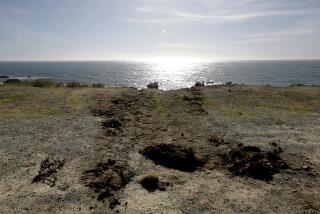Lives of Two Families Consumed by Custody Fight That Began in 1984 : Courts: The famed Morgan-Foretich battle over now 9-year-old Hilary continues, leaving each side markedly changed.
FALLS CHURCH, Va. — The photograph of the smiling toddler on Dr. Eric A. Foretich’s office bookshelf is the only sign of the pitched battle that has consumed two families’ lives for more than seven years.
Hilary Foretich is 9 now. She has spent most of her life as the subject of the world’s most celebrated and bitter custody dispute, a seemingly endless string of accusations and lawsuits spanning three continents and consuming an estimated $4 million in legal costs.
Hilary’s mother, Dr. Elizabeth Morgan, went to jail for 25 months rather than reveal the whereabouts of her daughter, whom she continues to contend was sexually abused by Foretich.
Foretich just as steadfastly denies the charge.
“I know that it will never entirely go away. I cannot entirely ever get away from it,” he said of the battle in a recent interview, his first in the two years since his daughter was discovered living under an assumed name in New Zealand.
Hilary still lives in New Zealand; Foretich, forbidden by a New Zealand family court judge from seeing his daughter, has no contact with her.
“Nothing, zero,” he said almost inaudibly, dropping his chin onto his chest.
The years of shrill public confrontation have ground down to a grim face-off: Morgan is resolute in her refusal to bring Hilary back to the United States, where standing court orders in the District of Columbia could result in her arrest.
“She cannot return and does not,” said Morgan’s husband, Paul R. Michel, a U.S. appeals court judge in Washington. “I travel a couple times a year to New Zealand to see my family in exile.
“For the rest of the century, I don’t see that there is any hope for change for us,” Michel said.
Michel said he could not discuss Hilary or her living situation; Morgan has been barred by the New Zealand court from talking about the case publicly.
The New Zealand judge denied Foretich visitation rights in 1990, saying they would put Hilary at the center of a renewed battle between her parents.
Foretich has seen his daughter only once in nearly four years--a tense, minutes-long encounter in a Christchurch, New Zealand, hotel two years ago. The child sat rigidly on her grandmother’s lap and barely spoke, he said.
“I’m sure by now she’s been brainwashed and doesn’t know what to believe,” he said.
Foretich is pursuing half a dozen lawsuits alleging defamation and ethics violations against media organizations and others, but has dropped his fight for custody of the girl, who no longer will be under the jurisdiction of the family court when she turns 18.
“My resources are depleted. And the bottom line is I don’t know how fair it was to my daughter over and above the financial considerations to continue the melee,” Foretich said. “The fact was, I had to just quit.”
Morgan alleges Foretich abused Hilary from about the age of 2. Her claims never have been tested in court and were not raised in the couple’s first custody contest in 1984.
Foretich, 49, said he took and passed a polygraph test examining his behavior with Hilary.
“Elizabeth refused to take one,” he said.
Morgan’s chief attorney, Stephen Sachs, did not respond to repeated requests for comment. He has said in the past that he is barred from discussing the case by the New Zealand court.
“She would never do anything that would jeopardize custody,” said another Morgan attorney, G. Allen Dale.
Morgan had hidden Hilary in defiance of a court order giving Foretich visitation rights, and she refused to divulge the girl’s whereabouts even after her 1989 release from the Washington jail where she had been held on civil contempt charges. She was released after President Bush signed a bill specially drafted in Congress to free her.
After a private investigator hired by Foretich found the child living with her maternal grandmother in February, 1990, Foretich flew to New Zealand immediately, hoping to bring the child home with him.
“She is a U.S. citizen,” he said. “This is where she belongs.”
People rarely mention the case to him now, Foretich said, “but everything I do or not do is colored by what went on--every single thing.”
He said he is trying to get on with his life and rebuild his oral surgery practice.
“If I’d done any of the things she says I’ve done, I would have left too,” Foretich said. “I’d have turned tail and run years ago. But I didn’t, because I didn’t do those things.”
Morgan, a plastic surgeon, is living with her mother in Christchurch and pursuing a doctorate at a local university, Michel said.
Licensing complications have kept her from practicing in New Zealand, he said.
“Her medical equipment is rusting in a warehouse in suburban Virginia,” Michel said. “She has no income and no way of gaining any income.”
More to Read
Sign up for Essential California
The most important California stories and recommendations in your inbox every morning.
You may occasionally receive promotional content from the Los Angeles Times.









